Hamlet: A Deep Dive into the Theme of Revenge in Shakespeare's Play
VerifiedAdded on 2022/08/31
|6
|1376
|35
Essay
AI Summary
This essay provides an in-depth analysis of the theme of revenge in William Shakespeare's play, Hamlet. It explores how the central theme of revenge is enacted by Hamlet, the prince, following the death of his father. The essay examines the motivations and actions of key characters, including Hamlet, Laertes, and Fortinbras, and how their quests for revenge lead to tragic consequences, including death and destruction within the kingdom of Denmark. The essay highlights the complexities of seeking retribution and its impact on the characters involved, emphasizing Shakespeare's portrayal of revenge as a destructive force that ultimately fails to bring about true equality or justice. The essay uses the soliloquies and actions of the characters to explore the theme of revenge and its consequences.
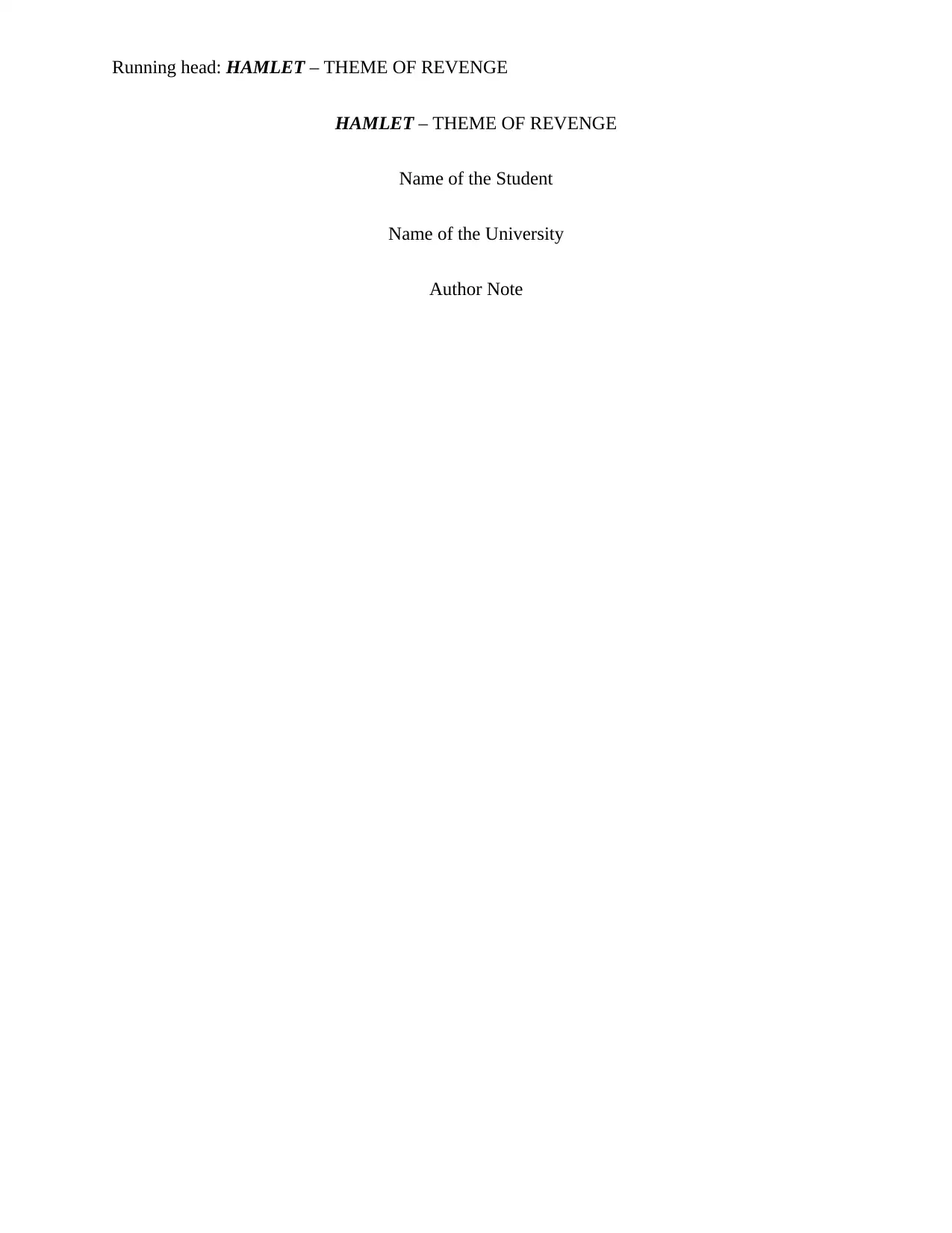
Running head: HAMLET – THEME OF REVENGE
HAMLET – THEME OF REVENGE
Name of the Student
Name of the University
Author Note
HAMLET – THEME OF REVENGE
Name of the Student
Name of the University
Author Note
Paraphrase This Document
Need a fresh take? Get an instant paraphrase of this document with our AI Paraphraser
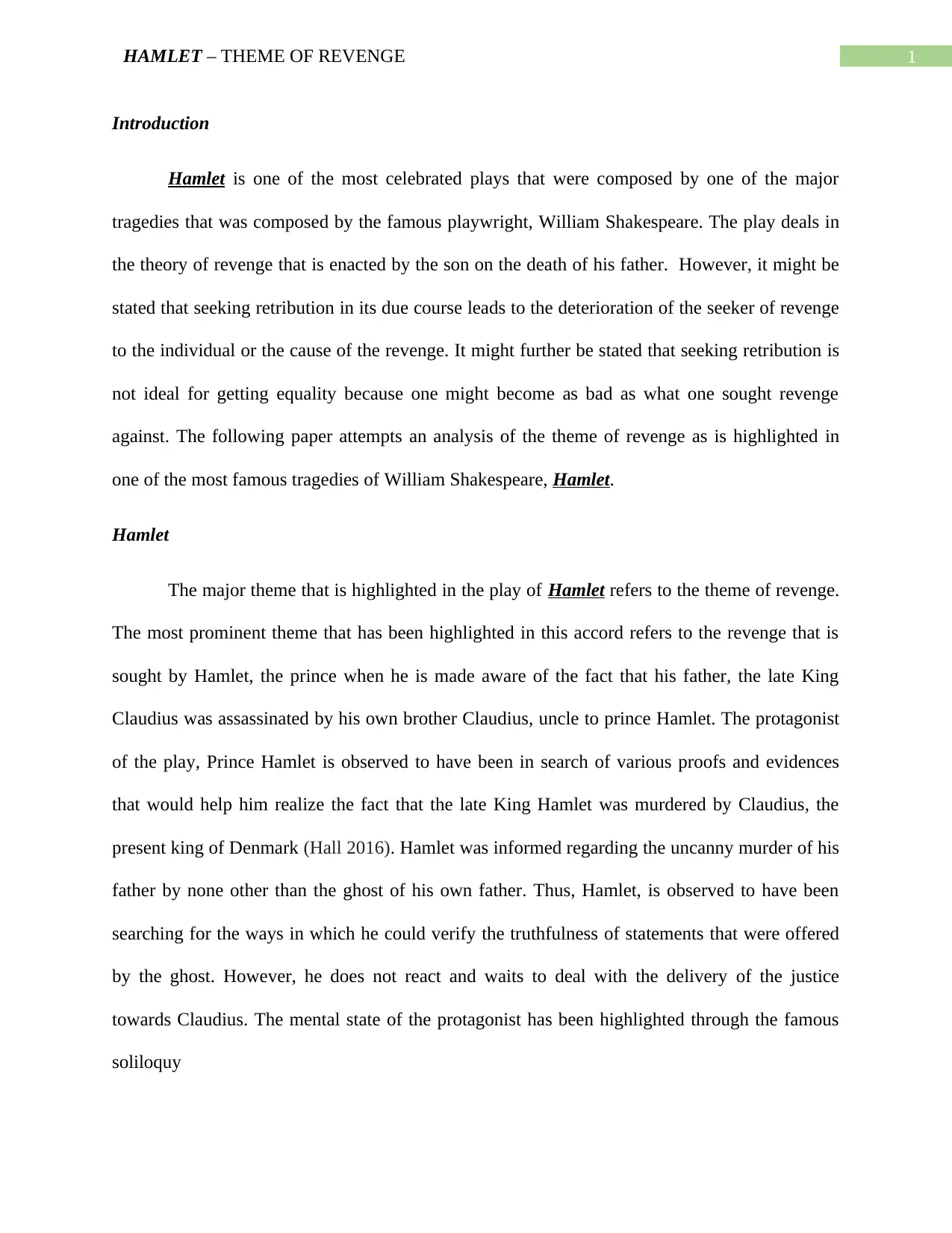
1HAMLET – THEME OF REVENGE
Introduction
Hamlet is one of the most celebrated plays that were composed by one of the major
tragedies that was composed by the famous playwright, William Shakespeare. The play deals in
the theory of revenge that is enacted by the son on the death of his father. However, it might be
stated that seeking retribution in its due course leads to the deterioration of the seeker of revenge
to the individual or the cause of the revenge. It might further be stated that seeking retribution is
not ideal for getting equality because one might become as bad as what one sought revenge
against. The following paper attempts an analysis of the theme of revenge as is highlighted in
one of the most famous tragedies of William Shakespeare, Hamlet.
Hamlet
The major theme that is highlighted in the play of Hamlet refers to the theme of revenge.
The most prominent theme that has been highlighted in this accord refers to the revenge that is
sought by Hamlet, the prince when he is made aware of the fact that his father, the late King
Claudius was assassinated by his own brother Claudius, uncle to prince Hamlet. The protagonist
of the play, Prince Hamlet is observed to have been in search of various proofs and evidences
that would help him realize the fact that the late King Hamlet was murdered by Claudius, the
present king of Denmark (Hall 2016). Hamlet was informed regarding the uncanny murder of his
father by none other than the ghost of his own father. Thus, Hamlet, is observed to have been
searching for the ways in which he could verify the truthfulness of statements that were offered
by the ghost. However, he does not react and waits to deal with the delivery of the justice
towards Claudius. The mental state of the protagonist has been highlighted through the famous
soliloquy
Introduction
Hamlet is one of the most celebrated plays that were composed by one of the major
tragedies that was composed by the famous playwright, William Shakespeare. The play deals in
the theory of revenge that is enacted by the son on the death of his father. However, it might be
stated that seeking retribution in its due course leads to the deterioration of the seeker of revenge
to the individual or the cause of the revenge. It might further be stated that seeking retribution is
not ideal for getting equality because one might become as bad as what one sought revenge
against. The following paper attempts an analysis of the theme of revenge as is highlighted in
one of the most famous tragedies of William Shakespeare, Hamlet.
Hamlet
The major theme that is highlighted in the play of Hamlet refers to the theme of revenge.
The most prominent theme that has been highlighted in this accord refers to the revenge that is
sought by Hamlet, the prince when he is made aware of the fact that his father, the late King
Claudius was assassinated by his own brother Claudius, uncle to prince Hamlet. The protagonist
of the play, Prince Hamlet is observed to have been in search of various proofs and evidences
that would help him realize the fact that the late King Hamlet was murdered by Claudius, the
present king of Denmark (Hall 2016). Hamlet was informed regarding the uncanny murder of his
father by none other than the ghost of his own father. Thus, Hamlet, is observed to have been
searching for the ways in which he could verify the truthfulness of statements that were offered
by the ghost. However, he does not react and waits to deal with the delivery of the justice
towards Claudius. The mental state of the protagonist has been highlighted through the famous
soliloquy
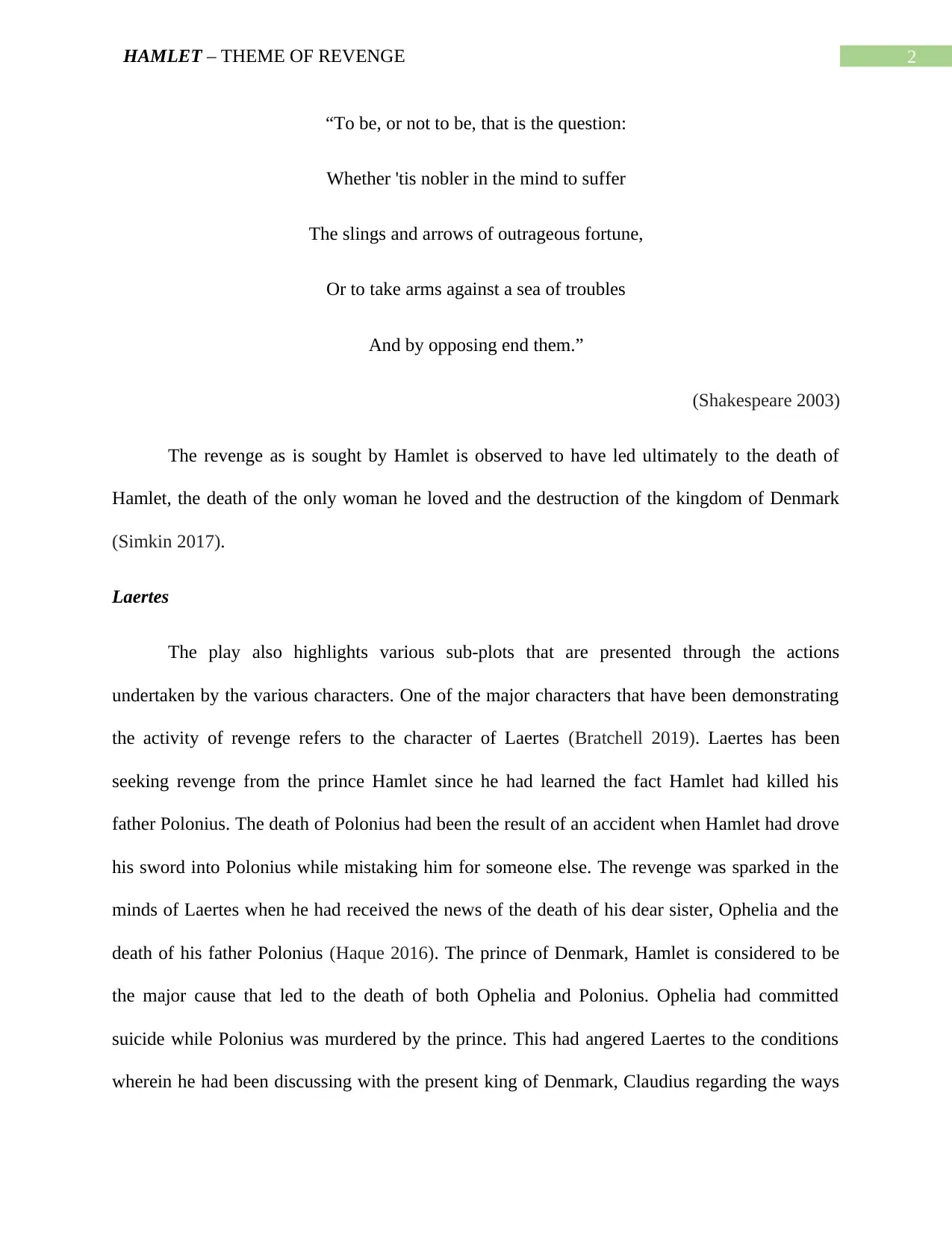
2HAMLET – THEME OF REVENGE
“To be, or not to be, that is the question:
Whether 'tis nobler in the mind to suffer
The slings and arrows of outrageous fortune,
Or to take arms against a sea of troubles
And by opposing end them.”
(Shakespeare 2003)
The revenge as is sought by Hamlet is observed to have led ultimately to the death of
Hamlet, the death of the only woman he loved and the destruction of the kingdom of Denmark
(Simkin 2017).
Laertes
The play also highlights various sub-plots that are presented through the actions
undertaken by the various characters. One of the major characters that have been demonstrating
the activity of revenge refers to the character of Laertes (Bratchell 2019). Laertes has been
seeking revenge from the prince Hamlet since he had learned the fact Hamlet had killed his
father Polonius. The death of Polonius had been the result of an accident when Hamlet had drove
his sword into Polonius while mistaking him for someone else. The revenge was sparked in the
minds of Laertes when he had received the news of the death of his dear sister, Ophelia and the
death of his father Polonius (Haque 2016). The prince of Denmark, Hamlet is considered to be
the major cause that led to the death of both Ophelia and Polonius. Ophelia had committed
suicide while Polonius was murdered by the prince. This had angered Laertes to the conditions
wherein he had been discussing with the present king of Denmark, Claudius regarding the ways
“To be, or not to be, that is the question:
Whether 'tis nobler in the mind to suffer
The slings and arrows of outrageous fortune,
Or to take arms against a sea of troubles
And by opposing end them.”
(Shakespeare 2003)
The revenge as is sought by Hamlet is observed to have led ultimately to the death of
Hamlet, the death of the only woman he loved and the destruction of the kingdom of Denmark
(Simkin 2017).
Laertes
The play also highlights various sub-plots that are presented through the actions
undertaken by the various characters. One of the major characters that have been demonstrating
the activity of revenge refers to the character of Laertes (Bratchell 2019). Laertes has been
seeking revenge from the prince Hamlet since he had learned the fact Hamlet had killed his
father Polonius. The death of Polonius had been the result of an accident when Hamlet had drove
his sword into Polonius while mistaking him for someone else. The revenge was sparked in the
minds of Laertes when he had received the news of the death of his dear sister, Ophelia and the
death of his father Polonius (Haque 2016). The prince of Denmark, Hamlet is considered to be
the major cause that led to the death of both Ophelia and Polonius. Ophelia had committed
suicide while Polonius was murdered by the prince. This had angered Laertes to the conditions
wherein he had been discussing with the present king of Denmark, Claudius regarding the ways
⊘ This is a preview!⊘
Do you want full access?
Subscribe today to unlock all pages.

Trusted by 1+ million students worldwide
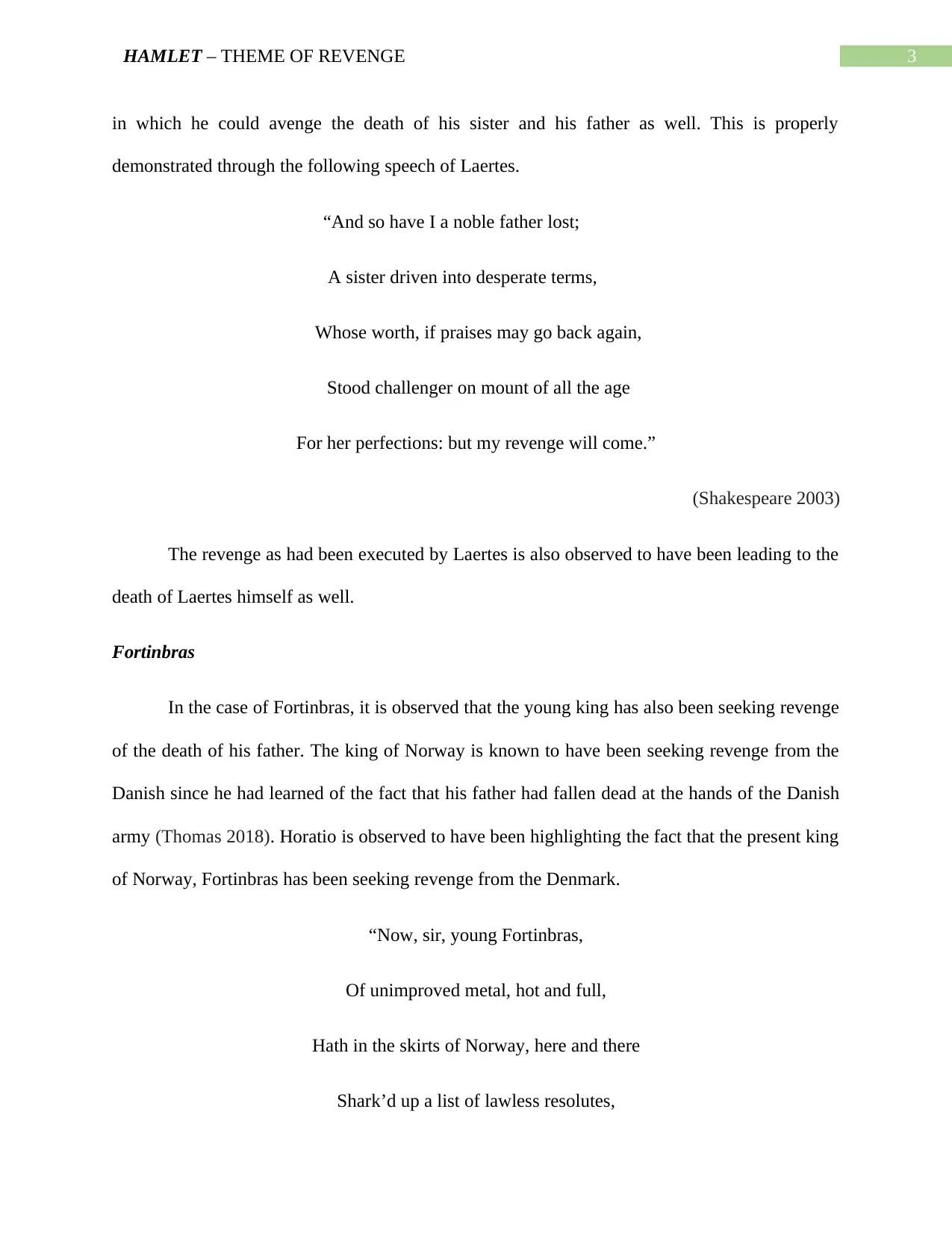
3HAMLET – THEME OF REVENGE
in which he could avenge the death of his sister and his father as well. This is properly
demonstrated through the following speech of Laertes.
“And so have I a noble father lost;
A sister driven into desperate terms,
Whose worth, if praises may go back again,
Stood challenger on mount of all the age
For her perfections: but my revenge will come.”
(Shakespeare 2003)
The revenge as had been executed by Laertes is also observed to have been leading to the
death of Laertes himself as well.
Fortinbras
In the case of Fortinbras, it is observed that the young king has also been seeking revenge
of the death of his father. The king of Norway is known to have been seeking revenge from the
Danish since he had learned of the fact that his father had fallen dead at the hands of the Danish
army (Thomas 2018). Horatio is observed to have been highlighting the fact that the present king
of Norway, Fortinbras has been seeking revenge from the Denmark.
“Now, sir, young Fortinbras,
Of unimproved metal, hot and full,
Hath in the skirts of Norway, here and there
Shark’d up a list of lawless resolutes,
in which he could avenge the death of his sister and his father as well. This is properly
demonstrated through the following speech of Laertes.
“And so have I a noble father lost;
A sister driven into desperate terms,
Whose worth, if praises may go back again,
Stood challenger on mount of all the age
For her perfections: but my revenge will come.”
(Shakespeare 2003)
The revenge as had been executed by Laertes is also observed to have been leading to the
death of Laertes himself as well.
Fortinbras
In the case of Fortinbras, it is observed that the young king has also been seeking revenge
of the death of his father. The king of Norway is known to have been seeking revenge from the
Danish since he had learned of the fact that his father had fallen dead at the hands of the Danish
army (Thomas 2018). Horatio is observed to have been highlighting the fact that the present king
of Norway, Fortinbras has been seeking revenge from the Denmark.
“Now, sir, young Fortinbras,
Of unimproved metal, hot and full,
Hath in the skirts of Norway, here and there
Shark’d up a list of lawless resolutes,
Paraphrase This Document
Need a fresh take? Get an instant paraphrase of this document with our AI Paraphraser
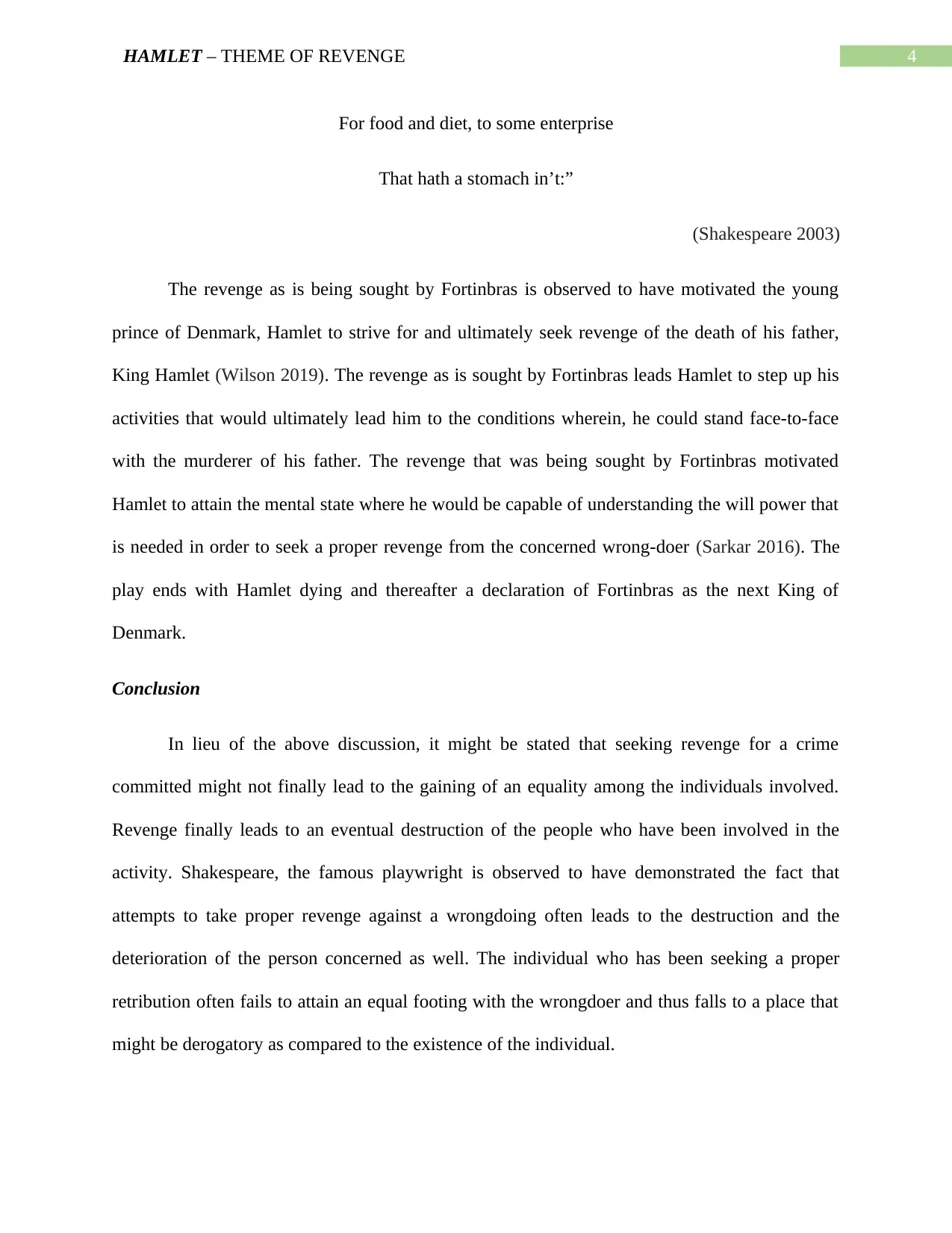
4HAMLET – THEME OF REVENGE
For food and diet, to some enterprise
That hath a stomach in’t:”
(Shakespeare 2003)
The revenge as is being sought by Fortinbras is observed to have motivated the young
prince of Denmark, Hamlet to strive for and ultimately seek revenge of the death of his father,
King Hamlet (Wilson 2019). The revenge as is sought by Fortinbras leads Hamlet to step up his
activities that would ultimately lead him to the conditions wherein, he could stand face-to-face
with the murderer of his father. The revenge that was being sought by Fortinbras motivated
Hamlet to attain the mental state where he would be capable of understanding the will power that
is needed in order to seek a proper revenge from the concerned wrong-doer (Sarkar 2016). The
play ends with Hamlet dying and thereafter a declaration of Fortinbras as the next King of
Denmark.
Conclusion
In lieu of the above discussion, it might be stated that seeking revenge for a crime
committed might not finally lead to the gaining of an equality among the individuals involved.
Revenge finally leads to an eventual destruction of the people who have been involved in the
activity. Shakespeare, the famous playwright is observed to have demonstrated the fact that
attempts to take proper revenge against a wrongdoing often leads to the destruction and the
deterioration of the person concerned as well. The individual who has been seeking a proper
retribution often fails to attain an equal footing with the wrongdoer and thus falls to a place that
might be derogatory as compared to the existence of the individual.
For food and diet, to some enterprise
That hath a stomach in’t:”
(Shakespeare 2003)
The revenge as is being sought by Fortinbras is observed to have motivated the young
prince of Denmark, Hamlet to strive for and ultimately seek revenge of the death of his father,
King Hamlet (Wilson 2019). The revenge as is sought by Fortinbras leads Hamlet to step up his
activities that would ultimately lead him to the conditions wherein, he could stand face-to-face
with the murderer of his father. The revenge that was being sought by Fortinbras motivated
Hamlet to attain the mental state where he would be capable of understanding the will power that
is needed in order to seek a proper revenge from the concerned wrong-doer (Sarkar 2016). The
play ends with Hamlet dying and thereafter a declaration of Fortinbras as the next King of
Denmark.
Conclusion
In lieu of the above discussion, it might be stated that seeking revenge for a crime
committed might not finally lead to the gaining of an equality among the individuals involved.
Revenge finally leads to an eventual destruction of the people who have been involved in the
activity. Shakespeare, the famous playwright is observed to have demonstrated the fact that
attempts to take proper revenge against a wrongdoing often leads to the destruction and the
deterioration of the person concerned as well. The individual who has been seeking a proper
retribution often fails to attain an equal footing with the wrongdoer and thus falls to a place that
might be derogatory as compared to the existence of the individual.
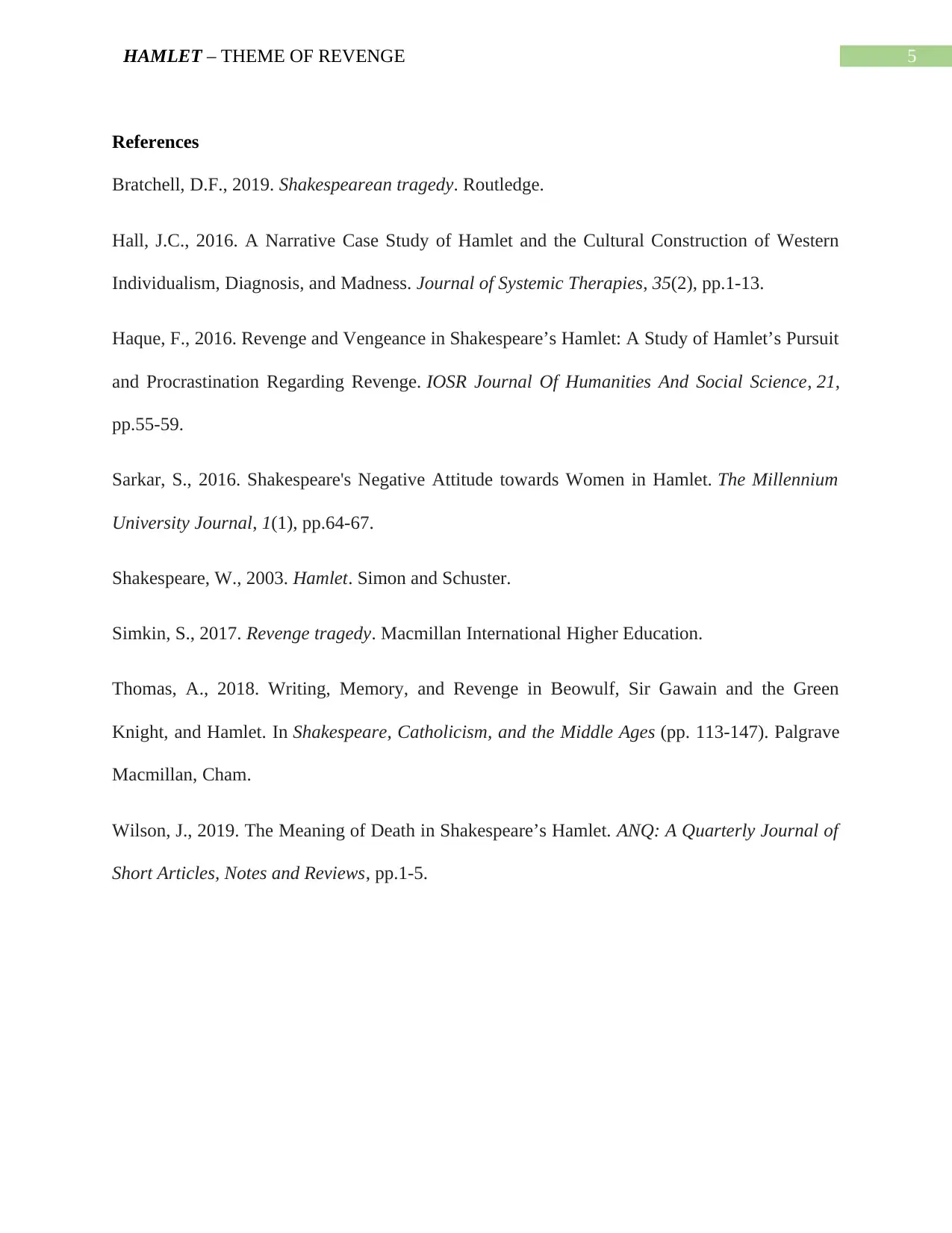
5HAMLET – THEME OF REVENGE
References
Bratchell, D.F., 2019. Shakespearean tragedy. Routledge.
Hall, J.C., 2016. A Narrative Case Study of Hamlet and the Cultural Construction of Western
Individualism, Diagnosis, and Madness. Journal of Systemic Therapies, 35(2), pp.1-13.
Haque, F., 2016. Revenge and Vengeance in Shakespeare’s Hamlet: A Study of Hamlet’s Pursuit
and Procrastination Regarding Revenge. IOSR Journal Of Humanities And Social Science, 21,
pp.55-59.
Sarkar, S., 2016. Shakespeare's Negative Attitude towards Women in Hamlet. The Millennium
University Journal, 1(1), pp.64-67.
Shakespeare, W., 2003. Hamlet. Simon and Schuster.
Simkin, S., 2017. Revenge tragedy. Macmillan International Higher Education.
Thomas, A., 2018. Writing, Memory, and Revenge in Beowulf, Sir Gawain and the Green
Knight, and Hamlet. In Shakespeare, Catholicism, and the Middle Ages (pp. 113-147). Palgrave
Macmillan, Cham.
Wilson, J., 2019. The Meaning of Death in Shakespeare’s Hamlet. ANQ: A Quarterly Journal of
Short Articles, Notes and Reviews, pp.1-5.
References
Bratchell, D.F., 2019. Shakespearean tragedy. Routledge.
Hall, J.C., 2016. A Narrative Case Study of Hamlet and the Cultural Construction of Western
Individualism, Diagnosis, and Madness. Journal of Systemic Therapies, 35(2), pp.1-13.
Haque, F., 2016. Revenge and Vengeance in Shakespeare’s Hamlet: A Study of Hamlet’s Pursuit
and Procrastination Regarding Revenge. IOSR Journal Of Humanities And Social Science, 21,
pp.55-59.
Sarkar, S., 2016. Shakespeare's Negative Attitude towards Women in Hamlet. The Millennium
University Journal, 1(1), pp.64-67.
Shakespeare, W., 2003. Hamlet. Simon and Schuster.
Simkin, S., 2017. Revenge tragedy. Macmillan International Higher Education.
Thomas, A., 2018. Writing, Memory, and Revenge in Beowulf, Sir Gawain and the Green
Knight, and Hamlet. In Shakespeare, Catholicism, and the Middle Ages (pp. 113-147). Palgrave
Macmillan, Cham.
Wilson, J., 2019. The Meaning of Death in Shakespeare’s Hamlet. ANQ: A Quarterly Journal of
Short Articles, Notes and Reviews, pp.1-5.
⊘ This is a preview!⊘
Do you want full access?
Subscribe today to unlock all pages.

Trusted by 1+ million students worldwide
1 out of 6
Related Documents
Your All-in-One AI-Powered Toolkit for Academic Success.
+13062052269
info@desklib.com
Available 24*7 on WhatsApp / Email
![[object Object]](/_next/static/media/star-bottom.7253800d.svg)
Unlock your academic potential
Copyright © 2020–2026 A2Z Services. All Rights Reserved. Developed and managed by ZUCOL.





